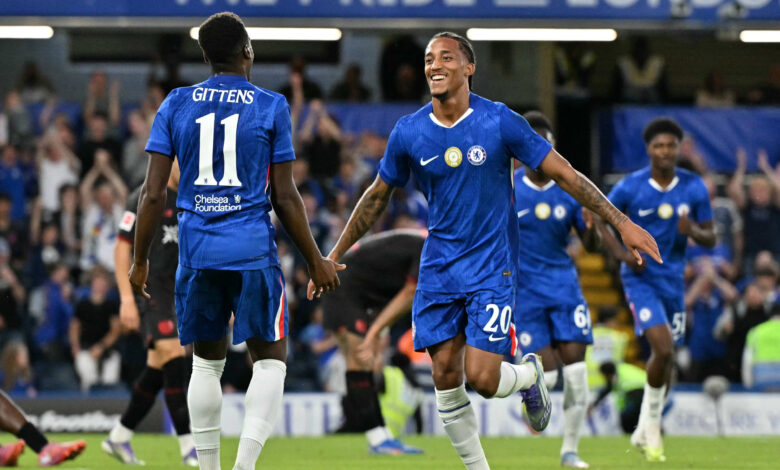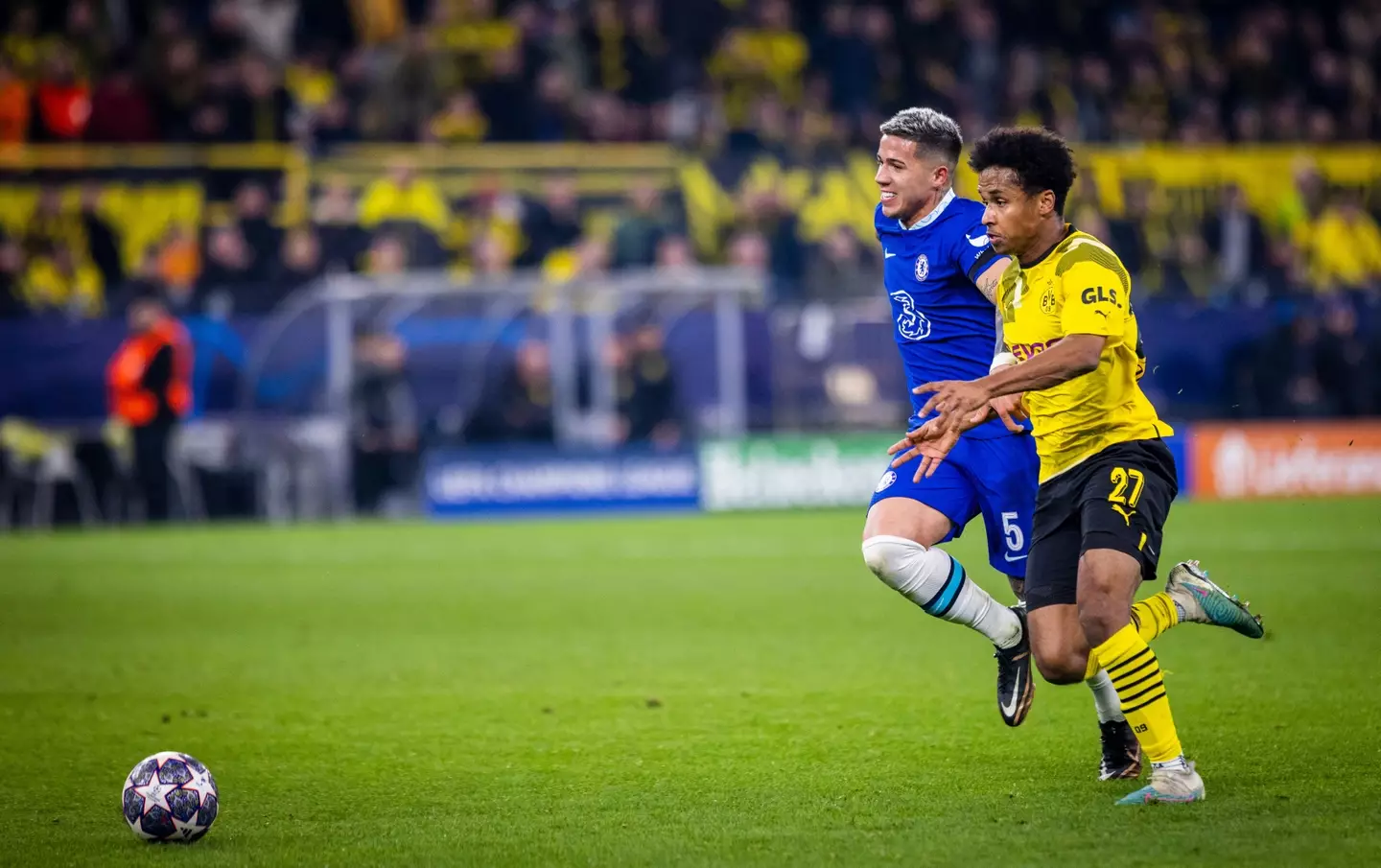
Chelsea carried the momentum from their impressive triumph at the revamped Club World Cup into their 25/26 preseason, producing two commanding performances at Stamford Bridge.
Over the course of those matches, the Blues found the net six times and conceded just once, recording back-to-back victories against Bayer Leverkusen and AC Milan.
Enzo Maresca’s squad returned to training last Monday, and despite having had limited preparation time, they wasted no opportunity to demonstrate their sharpness and intent ahead of the new Premier League campaign, which kicks off against Crystal Palace on Sunday afternoon.
These preseason games were more than just fitness exercises; they offered an opportunity to experiment with tactics, integrate fresh signings, and hand valuable minutes to emerging talents.
Among the standout youngsters were Estevão and Jamie Gittens, both of whom showed flashes of the technical quality and confidence that could make them important assets this season.
However, not all the news were positive. Chelsea’s impressive attacking patterns also exposed some recurring issues such as vulnerability in defensive transitions, Enzo Fernández’s positional uncertainty, and questions over how to integrate returning players like Wesley Fofana without disrupting Maresca’s right-side dynamics.
With optimism building and questions still lingering, we break down the five key talking points, both positive and negative, from Chelsea’s 25/26 preseason campaign.
Chelsea 25/26 Preseason: 5 Talking Points
1. Enzo Fernández’s Role Still Under the Microscope
Among Chelsea fans, there is a widespread belief that Enzo Fernández has been playing out of position ever since his arrival from Benfica a couple of seasons ago.
The World Cup and Club World Cup winner has often been used as a deep-lying midfielder, orchestrating play, dictating tempo, and threading passes that very few others can spot.
That vision and passing range are undoubtedly his greatest strengths. To thrive in that role, however, he needs time and space on the ball.
Unfortunately, those same large spaces can also expose his defensive vulnerabilities. One of the most memorable examples came in the Champions League against Borussia Dortmund during his first season, when Karim Adeyemi surged past him to score.

That moment highlighted that Enzo might not be the ideal player to shield the defence in high-pressure situations.
As a result, both Enzo Maresca and Mauricio Pochettino before him have sought ways to get the best out of the Argentine without sacrificing the team’s balance.
The solution has often been to deploy him further forward, between the lines, where he can act as a connector and arrive late in the box, a role in which he scored several important goals last season.
Against AC Milan in preseason, Enzo once again operated in this advanced position. However, there was little sign of improvement in his overall impact, raising fresh questions about whether this is truly the role that will unlock his full potential.
2. Reece James: Signs of a Revival?
Like Enzo Fernández, Reece James has faced his own positional identity challenges under Enzo Maresca over the past year.
Regarded as one of Cobham’s finest graduates and among the best right-backs in world football, the England international has often been deployed as an inverted full-back or even as a right centre-back in possession.
This approach stems partly from Maresca’s preference for full-backs to drift inside, creating numerical superiority in midfield, and partly from a desire to protect James from the type of injuries that have plagued his recent seasons.
However, this preseason has offered fresh hope. After a campaign in which he gradually built up his minutes, James now looks primed for a hybrid role, combining his duties as a right-sided centre-back in possession with the freedom to surge forward as a traditional attacking full-back when opportunities arise.
/Reece_James_and_Enzo_Maresca_with_the_CWC_trophy.jpg)
Against AC Milan, this balance was on display several times, most notably in the build-up to Chelsea’s second goal. His intelligent decoy run pulled defenders away, giving Pedro Neto the space to deliver a pinpoint cross for João Pedro to convert.
A fully fit, attack-minded Reece James is a formidable weapon. If Maresca can continue to manage his fitness and blend his defensive discipline with attacking intent, Chelsea may finally get to see their captain at his dynamic best again.
3. The Right-Hand Side Weapon
If Reece James’ resurgence is one promising subplot, the development of Chelsea’s right flank is another. Maresca appears to be building a devastating attacking network down that side, one capable of overwhelming even the most disciplined defences.
Against Bayer Leverkusen, the chemistry between Cole Palmer and Estevão was electric. The pair operated on the same wavelength, exchanging quick passes, drifting into pockets of space, and consistently stretching the opposition’s defensive shape.

Malo Gusto’s overlapping runs only added to the overloads, giving Chelsea a constant numerical advantage on the right.
Maresca carried that blueprint into the AC Milan friendly, this time with Pedro Neto joining Palmer, James, and Enzo Fernández in the mix.
Neto’s direct dribbling and Palmer’s vision created wave after wave of pressure, with Enzo feeding them incisive passes and arriving late to support attacks.
It is a nexus of movement and technical quality that, when fully tuned, could dismantle any back line in Europe.
The danger, however, is that such an aggressive setup demands a high level of defensive coverage, something Chelsea didn’t always have in this game.
4. Transition Troubles
The same adventurous approach that made Chelsea’s right flank so dangerous also exposed a potential Achilles’ heel.
With both James and Cucurella pushing forward simultaneously, and often high up the pitch, the team conceded several counter-attacking chances, particularly against AC Milan.
The risk is magnified without a more physically dominant, traditional number six to patrol the space left behind, and even more so in the absence of Wesley Fofana and Levi Colwill, two centre-backs capable of bailing the team out in these situations.
The result was that Chelsea’s central defenders were often left isolated, scrambling to contain quick transitions.
The trade-off is clear: offensively, it can lead to moments like the second goal against Milan, where Neto’s overlap was decisive; defensively, it can leave the back line dangerously exposed.
In preseason, such experiments are expected, even encouraged, but in the Premier League, this level of risk could be ruthlessly punished.
Maresca will need to fine-tune the balance, ensuring the attacking fluidity doesn’t come at the cost of defensive stability.
5. Fofana Is Back, But Where Will He Play?
Wesley Fofana’s return to full preseason training is one of the most encouraging storylines for Chelsea fans.
After enduring two serious injuries last season, the Frenchman missed a significant chunk of competitive action and was absent from all of Chelsea’s summer friendlies.
Maresca confirmed in his pre-match press conference that Fofana is in contention to feature against Crystal Palace on Sunday, but the real question is: in what role?
Traditionally, Fofana has operated as the right-sided centre-back in possession, forming a partnership with the now-injured Levi Colwill.
However, in his absence, that slot has often been occupied by Reece James or Malo Gusto, who occasionally push forward to facilitate the fluid right-flank overloads the coach is building.
This raises a tactical dilemma: how to reintroduce a defender of Fofana’s quality without disrupting an attacking dynamic that has been one of Chelsea’s main preseason strengths.
One solution could be to shift Fofana to the left centre-back position, a role Trevoh Chalobah experimented with during preseason.
Fofana’s aggression, pace, and ability to win 1v1 duels could be instrumental in shutting down the counter-attacks Chelsea have been vulnerable to, as discussed earlier.
Playing him on the left would also give Marc Cucurella greater license to join attacks, knowing there is an athletic recovery defender behind him.
Chelsea fans may recall a similar tactical tweak under Thomas Tuchel, when Antonio Rüdiger’s move to the left side brought defensive solidity and attacking balance.
A mirrored setup with James on the right and Fofana on the left could give Chelsea a pair of defenders capable of dominating individual battles while supporting Maresca’s possession game.
Are Chelsea Ready for the Season, Then?
Surprisingly, Chelsea appear more prepared for the new campaign than many might have expected, especially given their relatively short preseason.
The sharpness on display in recent friendlies has been impressive, perhaps most notably in the 4-1 win over AC Milan, a performance that outshone what Arsenal and Liverpool managed against the same opponent.
While Chelsea played much of the match with a man advantage, it’s worth noting that Milan had still beaten Arsenal on penalties and dispatched Liverpool 4-2 earlier in their preseason tour.
The squad looks fit, the patterns of play are already developing under Maresca, and there is a level of depth across all positions that will allow for effective rotation throughout the season.
This depth could prove decisive in a year where the main Premier League title contenders each have a potentially fatal flaw:
Liverpool lack depth in almost every area and continue to look vulnerable to counter-attacks.
Arsenal are still without a truly elite left winger and arguably need one or two more high-quality forwards to maintain their edge.
Manchester City, despite their dominance in possession, have shown they can be exposed defensively when pressed or hit in transition.
By contrast, Chelsea’s main challenge will be sustaining their momentum and avoiding the injuries that have derailed past campaigns.
While statistical models give them just an 8% chance of winning the league, the early signs suggest that if Maresca’s side continue to build on their current rhythm, they could find themselves in the thick of the title race far sooner than expected.





